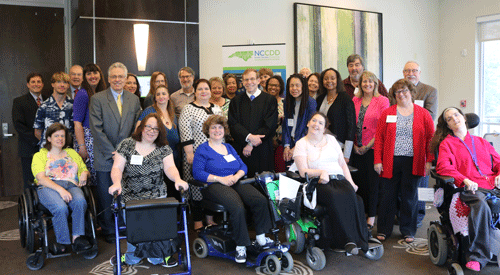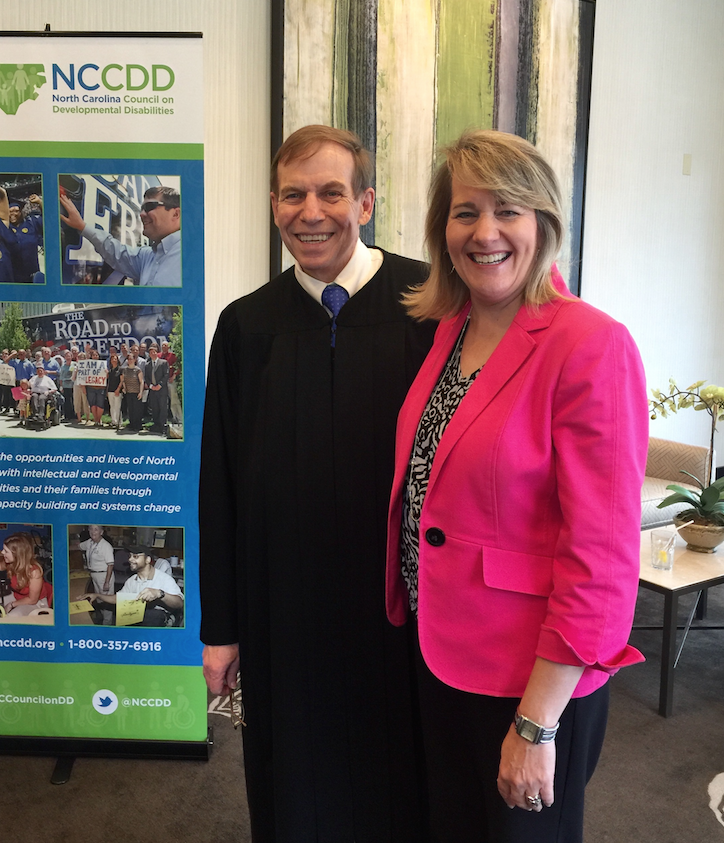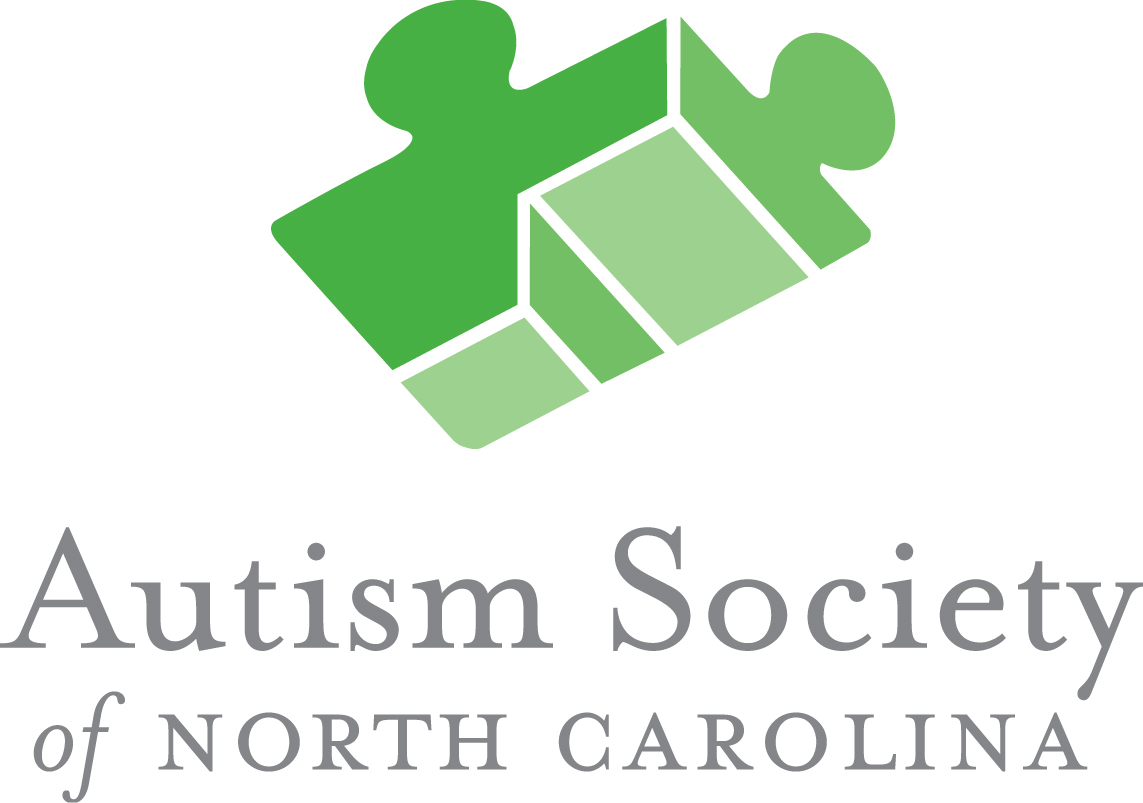May 2016: Highlights and Hot Topics

May 2016 Highlights & Hot Topics
Download a pdf of the May newsletter here.
A Message from Our Executive Director
It's always exciting to hear from representatives of NCCDD funded initiatives and to learn about success and outcomes being achieved through these efforts. At our May Council meeting, several initiative leaders shared updates with us. You'll read more details below, but let me share a few of the highlights with you:
- Upward to Financial Stability: Completed a resource mapping toolkit that reached over 2,340 individuals this year.
- NC Emergency Preparedness - Provided Community Emergency Response Teams with inclusive terminology as well as photos and examples featuring people with I/DD. Information is now being shared with Federal Emergency Management Agency (FEMA).
- Medical Health Homes - September 2015 Summit had 48 attendees and spurred numerous conversations and partnerships. Also, with the Autism Society of North Carolina, the initiative released an online resource directory that was in part funded by the grant through NCCDD.
 North Carolina Supreme Court Justice Robert Edmunds also attended our meeting to meet and reaffirm the Council members. It was a great experience for our members, and we thank Justice Edmunds for joining us!
North Carolina Supreme Court Justice Robert Edmunds also attended our meeting to meet and reaffirm the Council members. It was a great experience for our members, and we thank Justice Edmunds for joining us!
And it wouldn't be May without graduations! We congratulate our graduates from University of North Carolina - Greensboro's Beyond Academics and Western Carolina University's University Participant program! We are all proud of the graduates and all that they have achieved.
Stay tuned for more information as the Council continues its work on the Five Year Plan and events to commemorate the Americans with Disabilities Act in July!
Chris Egan
Executive Director
Innovations Waiver
The NC Innovations Waiver (1915c waiver) is a Home and Community Based Services waiver that provides supports to children and adults with intellectual and other developmental disabilities (I/DD). Proposed changes to the waiver were submitted to Centers for Medicare & Medicaid Services (CMS) last October. These changes include some new services - Community Living and Supports, Community Navigator, Supported Living - and some adjustments to current services. One of the more significant changes is the addition of a Resource Allocation method which will be used to determine levels of funding for services.
The state is waiting on final approval from CMS. The implementation of these changes have been delayed until November 1, 2016.
Medicaid Reform
Reform of the Medicaid system in NC is being planned using an 1115 Medicaid waiver that will change the current Medicaid physical health care fee-for-service system into a managed care program. As reported previously, a draft of this plan was released in March. The NC Department of Health and Human Services (DHHS) received feedback from stakeholders, including the NC Council on Developmental Disabilities (NCCDD), over the past two months and will submit the plan to CMS on June 1, 2016.
The proposed plan provides a structure for how Medicaid health care services will be provided, but does not include a great deal of detail. NCCDD will continue to provide input through public comments, written recommendations and through initiatives such as the Stakeholder Engagement Group and the Medical Health Homes project. The goal of input is to ensure that people with I/DD have access to appropriate physical health supports, behavioral health supports and long-term supports in an integrated, comprehensive, person centered manner.
State Budget
The legislature is currently working on the State budget. While we were pleased with elements of the Governor's budget which included additional Innovations waiver slots, expansion of autism services and case management for children with complex needs, the Governor's Budget was only the first step in the budgeting process. The House began work on their budget following the Governor's announcement and recently released their proposed budget which included $30 million to address mental health and substance use disorders needs and $30 million to replace a small part of the $152 million cut to LME/MCOs. However, it did not include the additional Innovations waiver slots.
The next step is for the Senate to release a proposed budget, which will be followed by a Legislative committee being appointed to address differences between the two budgets and propose a final budget for approval. It is anticipated that this process will happen quickly, and we will keep you updated.
Achieving a Better Life Experience (ABLE) Act:
Senator Burr of North Carolina, along with the original bipartisan cosponsors of the ABLE Act, have introduced a trio of bills to strengthen and improve the existing savings program being implemented here in North Carolina and across the country. These bills (see below) reflect many of the goals identified by the Council in our strategic plan.
The ABLE to Work Act would allow individuals and their families to save more money in an ABLE account if the beneficiary works and earns income. Specifically, an ABLE beneficiary who earns income from a job could save additional funds beyond the current maximum up to the Federal Poverty Level, which is currently at $11,770. The bill will also allow ABLE beneficiaries to qualify for the existing Saver's Credit when they put savings in. Read about the ABLE to Work Act here.
The ABLE Financial Planning Act would allow families to roll over savings in a 529 college savings plan into an ABLE account. Many families save for a child's college education by opening a 529 account, sometimes before their child is even born. For individuals who are later diagnosed with or acquire significant disability, they may want a more flexible vehicle for their savings. The ABLE Financial Planning Act would help these families by allowing them to roll over the funds in their 529 account into an ABLE account, without financial penalty, for their qualifying child. Read about the ABLE Financial Planning Act here.
The ABLE Age Adjustment Act would raise the age limit for ABLE accounts to age 46. Currently, individuals with a significant disability prior to the age of 26 are eligible to open an ABLE account. Many disabilities and conditions occur or are diagnosed later in life. Increasing the age limit for ABLE accounts will allow more individuals to save in these accounts to help cover a variety of allowable costs including housing, education, employment support, personal care and more. Read about the ABLE Age Adjustment Act here.
Older Americans Act
The Older Americans Act now includes a long-sought opportunity for the disability community. May is Older Americans Month, and President Obama's proclamation states, "One of the best measures of a country is how it treats its older citizens. During Older Americans Month, let us pay tribute to the men and women who raised, guided, and inspired us and let us honor their enduring contributions to our society by safeguarding their rights and the opportunities they deserve."
Aging self advocates and family members have helped blaze a trail for individuals with intellectual and other developmental disabilities. Their advocacy, passion and innovation launched a movement that has led to broadening opportunities for individuals with disabilities. In reauthorizing the Older American's Act in mid April (Public Law 114-144) , Congress demonstrated that awareness and included a fix to the National Family Caregiver Support Program (NFCSP). This modestly funded program offers state grants to provide information to caregivers about available services, assistance in accessing services, individual counseling, support groups, caregiver training, respite care, and supplemental services. The new law now extends eligibility to older relative caregivers (age 55 and over) of adults with disabilities (age 19 to 59) for the first time since its 1965 inception.
They are among 70 who are interning at nine sites, primarily hospitals, throughout North Carolina through Project SEARCH, a model launched in 1996 in Cincinnati.
Funding several of the North Carolina programs has been the North Carolina Council on Developmental Disabilities. The council, a stand-alone state agency mandated and funded by the federal government, works to give people with disabilities and their families access to – and a voice in shaping – services and support they need. - See more at: http://nccdd.org/news-media/in-the-news/335-triangle-business-journal-hospital-partnership-aids-individuals-with-disabilities.html#sthash.40OFSeU0.dpuf
Council Member Spotlight: Paula Woodhouse
 Council member Paula Woodhouse is a career human resources (HR) professional and mother of three. Woodhouse's advocacy began with the birth of her oldest daughter over 24 years ago when her daughter was diagnosed with an intellectual disability shortly after birth.
Council member Paula Woodhouse is a career human resources (HR) professional and mother of three. Woodhouse's advocacy began with the birth of her oldest daughter over 24 years ago when her daughter was diagnosed with an intellectual disability shortly after birth.
The ever-vigilant parent, Woodhouse has watched her passion for advocacy evolve as her daughter grew into adulthood and has continually sought ways to integrate this advocacy into the professional realm. Woodhouse currently serves as the Deputy Director of the North Carolina Office of State Human Resources.
Prior to that, she had a 10-year stint with the North Carolina Health and Human Resources where she oversaw compensation needs for the agency, Woodhouse's expertise in the human resources field uniquely positioned her to fill HR roles with the organizations committed to supporting individuals with intellectual and developmental disabilities (I/DD) throughout her career.
Outside the office, her personal advocacy currently centers around identifying meaningful employment and alternative housing for people with disabilities that promote independence and allow for full-life experiences.
"While there are many urgent needs with the I/DD community, I feel like employment and housing are at the top of the list. This crucial component is foundational for those who seeks to be independent."
Woodhouse continues, "Without suitable options for employment and housing, the other challenges faced for people with disabilities become even more challenging to resolve. While on the Council, I'm interested in forming sub-committees around this topic. My hope is that, given my background and current position, that I will be able to influence policy around the matter leading to new ways of thinking and creative solutions that haven't been approached before now."
Like most parent advocates, her focus has not always remained around employment and housing. As her daughter got older, she addressed advocacy needs as they arose, both in academic setting and beyond. With her daughter's recent transition to adulthood, Woodhouse aims to create experiences and living situations for her daughter where she can discover the greatest level of independence possible.
Woodhouse notes that her current interest in employment and housing is one that is faced by many parent advocates and is an area that raises questions of future planning and long-term solutions not currently offered in North Carolina. She feels that services and supports in their current form do only a nominal job in covering the essentials for people with I/DD, and she feels that in order to facilitate greater independence and freedom of financial mobility for people with I/DD, a greater investment from the business community is essential. Of equal import, she feels that minimizing the barriers to supports within the public sector also requires urgent attention.
While her professional background and expertise lend themselves to address these issues from a policy perspective, her commitment and passion as a parent-advocate is what grounds her in the reality of what the I/DD community needs. It is this passion that informs her perspective and guides her in drafting and proposing policy changes at the local, state and national levels.
Taking Initiative: Medical Health Homes and The Autism Society of North Carolina Create Online Database of Resources The Autism Society of North Carolina (ASNC) has created an online database of resources available to families in North Carolina. The goal of the Resource Directory is to provide a searchable, accurate, and easy-to-use directory of resources related to autism and other developmental disabilities.
The Autism Society of North Carolina (ASNC) has created an online database of resources available to families in North Carolina. The goal of the Resource Directory is to provide a searchable, accurate, and easy-to-use directory of resources related to autism and other developmental disabilities.
The Resource Directory was supported in part by the University of North Carolina at Chapel Hill's Autism Spectrum Disorder State Implementation Grant from the Maternal and Child Health Bureau, U.S. Department of Health and Human Services, and the Medical Health Homes for People with Intellectual and Developmental Disabilities Initiative of the NC Council on Developmental Disabilities (NCCDD).
"Access to care is improved when families and individuals can obtain resource information in a timely manner," said Karen Luken, Disability and Health Consultant for the NCCDD integrated care initiative. "People want to know about local, regional, and state resources so they can find solutions for their family. We are excited that this is an evolving resource that will expand options."
The Resource Directory allows users to search by category of service, a keyword, or a provider agency's name. It includes North Carolina-specific resources that are most often requested by families or recommended by the Autism Resource Specialists that ASNC employs throughout the state.
Many of the initial resources listed in the Resource Directory are directed at families of young children and focused on screening, diagnosis, and early intervention resources as well as specialized pediatric services to improve development. ASNC plans to expand and improve the listings in the Resource Directory to cover more types of resources.
Access the Resource Directory here.